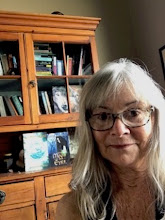1. Tell us about yourself--full-time writer? fiction-non-fiction? both?
I am retired, and now a part-time writer. My first soft-cover book was non-fiction, but I am attempting a science fiction novel. This is proving to be a tad more difficult. I have two other non-fiction books in process. While not writing full-time, the percentage of time spent writing is getting larger by the day. I have done a lot of technical and management writing over the course of two careers, material that people had to read. Now, I am faced with the challenge of writing books that people will want to read; a different kettle of fish, to be sure.
2. What led you to self-publish? had you tried the traditional way first?
I self-published for expediency. My first book is a collection of life vignettes, most humorous. They were encouraged by my wife and two daughters to document my stories for my grandchildren and posterity, not necessarily as a book. Most of the stories were written as assignments in a seminar conducted by a local Pulitzer Prize-winning writer and journalist. When he, and members of the seminar, chuckled naturally when reading these stories during critique sessions, I decided to assemble them as a book for others to enjoy. Going from a collection of stories to a self-published book taught me a lot: editing, Library of Congress number, ISBNs, bar code on the outside back cover, front cover design, font, color of paper, margins, size, and the like. I self-published to put the books into the hands of many family members and friends in a reasonable length of time, rather than wait for the traditional publishing process to take root, if at all. I am keeping the door open to traditional publishing, including electronic publishing, which may not be considered traditional (e.g., Amazon / Kindle).
3. How hard has it been to bring your book into the marketplace? (or easy) costly?
It has been relatively difficult to bring the book into the market place, mostly because of the lack of knowledge on how to do this. I do not have an agent, but professional writers have advised me that I will need one to interface with the major publishers. My major cost was the cost of printing the book, 100 or so at a time. My profit margin is very thin. Publication costs can be reduced significantly through a large printing company, but the minimum order can be on the order of a 1,000 books, or so. That could take up a large corner of my den room, plus add the administrative headaches of distribution and accounting. I have distributed the book, on a consignment basis, to local book stores. The 40% cut to the store, reasonable as it is, makes such books sales a loss-leader for more lofty objectives (readings/signings and getting known). I have had a reading/signing session, which was certainly a learning experience.
4. Are you satisfied with your experiences?
I am very satisfied with my experiences, being they were learning experiences. I expect the traditional publishing route will be more frustrating, but that is how one learns. I expect rejections will be more than a few, realizing that publisher, and agents, will look at my books in the cold hard light of expected sales volume and profit potential.
5. What advice would you give others regarding book publishing?
I have no advice, yet, on the traditional route. However, I would suggest that new writers go through the entire process of self-publishing, complete with all the trappings of a published book. Expect to spend $1,000 to $2,000, most non-recoverable, to get the first batch into people’s hands, some being casual purchasers at a book store. Then solicit feedback, with the understanding that a published book makes the writer vulnerable to criticism from many corners. On the writing itself, my advice is to fear criticism not. Write as you would speak to someone over a cup of coffee (i.e., your voice), not as you think a successful writer should compose. When inspired to write, no matter the time of day or night, sit down and talk to your computer, maybe with a cup of coffee, and pay little attention to structure, grammar, and the like. That will come later. Let the thoughts flow, unrestricted. Then come back and reread, and reread, sifting through the core material, trimming here and there, changing adjectives in keeping with how you normally speak, deleting distracting material (even if you think it is beautiful sentence or paragraph), delete "dead" sentences that contribute nothing to the story line, and just take up space. Then, give a version to an independent editor, even if your spouse, but someone who tells it like it is, without bias (may a writing group).

No comments:
Post a Comment